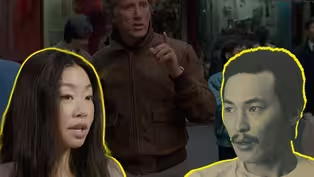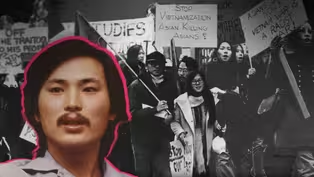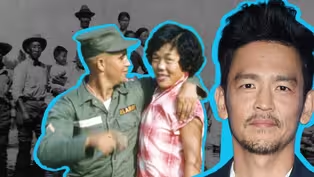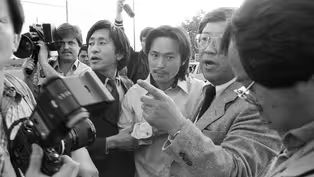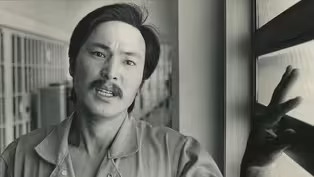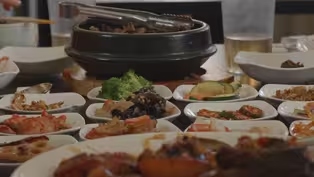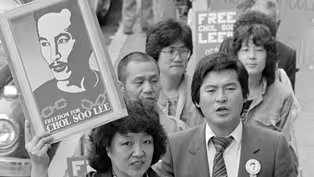
Free Chol Soo Lee
Season 24 Episode 12 | 1h 24m 52sVideo has Audio Description, Closed Captions
Rollercoaster story of Chol Soo Lee, a Korean immigrant wrongfully convicted of murder.
Sentenced to life for a 1973 San Francisco murder, Korean immigrant Chol Soo Lee was set free after a pan-Asian solidarity movement, which included Korean, Japanese, and Chinese Americans, helped to overturn his conviction. After 10 years of fighting for his life inside California state prisons, Lee found himself in a new fight to rise to the expectations of the people who believed in him.
See all videos with Audio DescriptionADProblems playing video? | Closed Captioning Feedback
Problems playing video? | Closed Captioning Feedback

Free Chol Soo Lee
Season 24 Episode 12 | 1h 24m 52sVideo has Audio Description, Closed Captions
Sentenced to life for a 1973 San Francisco murder, Korean immigrant Chol Soo Lee was set free after a pan-Asian solidarity movement, which included Korean, Japanese, and Chinese Americans, helped to overturn his conviction. After 10 years of fighting for his life inside California state prisons, Lee found himself in a new fight to rise to the expectations of the people who believed in him.
See all videos with Audio DescriptionADProblems playing video? | Closed Captioning Feedback
How to Watch Independent Lens
Independent Lens is available to stream on pbs.org and the free PBS App, available on iPhone, Apple TV, Android TV, Android smartphones, Amazon Fire TV, Amazon Fire Tablet, Roku, Samsung Smart TV, and Vizio.
Buy Now
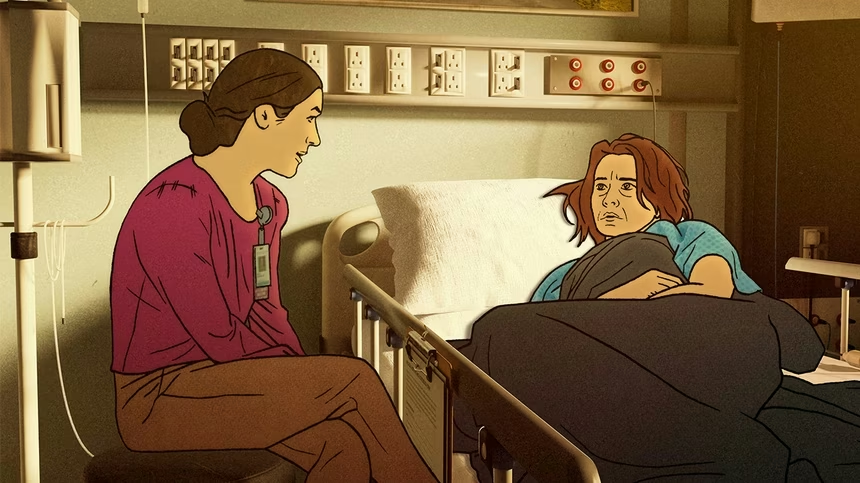
The Misunderstood Pain Behind Addiction
An interview with filmmaker Joanna Rudnick about making the animated short PBS documentary 'Brother' about her brother and his journey with addiction.Providing Support for PBS.org
Learn Moreabout PBS online sponsorshipPart of These Collections
Providing Support for PBS.org
Learn Moreabout PBS online sponsorship[upbeat music] ♪ ♪ - [exhales] - It's all right.
It's all right.
- Okay, I have speed.
- Okay, um... Let's start from the beginning.
Might as well.
- Okay.
- Um, you know, it didn't look good for you when they came for your arrest.
You had 41 rounds of live ammo.
You had a .357 Magnum in your room.
And you were on probation for felony theft.
- Mm-hmm.
- Is that a different issue?
[Tower of Power's "You're Still a Young Man"] ♪ ♪ - ♪ You're still a young man ♪ ♪ Baby, ooh, ooh ♪ ♪ Don't waste your time ♪ - At the time, I was a couple months short of my 21st birthday.
- ♪ Baby ♪ - I was just a young street punk, not even thinking about the time of day.
- ♪ Don't waste your time ♪ [lighter snaps] - And I was living in Chinatown.
- ♪ Down on my knees ♪ - I used to hang out around Jackson Street and at Mike's Pool Hall... [pool balls clack] Which were popular spots for the Chinatown street gangs.
But I was not bothered once by them.
I had a quiet personality.
I often felt like the lone Korean in Chinatown.
- When I first met Chol Soo Lee, he was always smiling.
I think he smiled for us.
He was always smiling.
So at that time, my older sister, she worked in a pearl store.
Each time she was gonna open an oyster, Chol Soo, he would peer over to her opening and revealing the pearl.
And he would ask her about that.
"How do you know there's gonna be a pearl inside?"
And, "What kinds of pearls were going to come out?"
And he stuck around and he stuck around till closing.
She just felt that he was alone.
And so she just said, "You wanna come over for dinner?"
[chuckles] And he said-- and he said yes.
He knew a lot of people.
But he would always be the only Korean.
And so everybody just-- "Oh, you mean the-the Korean guy?"
[chuckles] And we'd just see him.
We'd go out to eat sometimes after work.
There was once he asked me to go see his probation officer with him because he said, "If I bring this nice Japanese girl, "then they'll think that I have good friends and think better of me."
- I was on probation for theft.
Ever since I arrived from Korea as a kid, I didn't like staying home too much.
So I was out on the street a lot.
When you're out there, what are you gonna eat?
You have to steal something or do something, right?
By 1973, I was doing odd jobs.
Sometimes I'd work as a barker for the strip joints on Broadway.
Those are the guys who stand in front of the nightclubs trying to lure in the customers.
One night, the manager showed me his gun.
It was the first time I ever held a gun before.
I asked if I could borrow it.
Back at my place, I was cocking it back and forth.
You know, messing around with it.
[gunshot] Then accidently shot the wall.
[dramatic music] Five days later, I was arrested.
But when they told me it was for a murder, I couldn't believe what they were saying.
I didn't know nothing about any murder.
- Yip Yee Tak was gunned down execution-style in front of hundreds of terrified witnesses.
- The shooting occurred around 7:30 p.m. at the intersection of Pacific and Grant Avenues.
Eyewitnesses say the victim was shot from behind in the head by a Chinese man in his early 20s.
♪ ♪ - They said the bullet I shot into my wall was shot from the murder weapon.
- We ended up with three positive identifications of Mr. Lee as being the perpetrator of the killing.
♪ ♪ It was regarding a $10,000 alleged rip-off by the victim from his own gang.
And they hired Mr. Lee to kill, uh, one of their own members for taking this money.
- It just shocked me that Chol Soo would have been arrested for a Chinatown murder.
In Chinatown, people knew that the Korean didn't do it.
♪ ♪ I had been sentenced to life in prison for a crime I did not commit.
♪ ♪ It was a quiet trip.
I looked out the window like it might be my last time seeing the view.
The deputy had the radio playing at a low volume.
And there was a song I still remember hearing during that drive.
"You're Still a Young Man" by Tower of Power.
- ♪ You're still a young man ♪ ♪ Baby, ooh, ooh ♪ ♪ Don't waste your time ♪ - I felt very old, as if life was closing in on me at age 21.
- ♪ Baby, ooh, ooh ♪ ♪ Don't waste your time ♪ - As soon as I got to the prison, I was subjected to my first strip search.
- Put your head down.
Okay.
Raise your arms up.
Up higher.
[cell door clangs, squeaks] Spread your legs.
Okay, this time I want you to bend over.
- As many times as we had to repeat this routine, convicts never felt indifferent to the degradation and dehumanization of such treatment.
This built up a fire of hell within us.
- These are members of prison gangs.
Men so violent that the maximum security unit is divided into sections for different gangs to keep them from attacking each other and from preying on non-members.
- I was at one of California's most violent prisons at a time when all the gangs were at war with each other.
Its nickname was "Gladiator School."
Within less than one year, I witnessed a convict get his head bashed in, another killed on a weight bench.
And one inmate get stabbed 24 times right out in the open.
This suddenly became my world.
How was I, an inexperienced, lone Asian convict, going to stay alive?
I followed the first rule of survival in any prison system-- show no fear.
- This wrongness... was so wrong.
What, uh... what are you gonna do about it?
And I thought, "I'm going to become that lawyer that will take that kind of case."
And then all--at that point, all I could do was just, like, be his friend.
♪ ♪ - I started to have feelings for her.
But she did not feel the same way about me.
That could've caused her to cut me off, but she didn't.
Instead, Ranko's response all throughout the years reflected a struggle for justice as her main inspiration.
It may not have been a personal relationship, but Ranko's friendship was pure light in my darkened world.
[upbeat music] - Colorful...the morning's "Sacramento Union."
Good news, great people.
People like K.W.
Lee, award-winning investigative reporter.
K.W.
Lee, digging, probing, tackling the bureaucracy, infiltrating the unknown.
Read K.W.
Lee.
[typewriter clacking] [tense music] ♪ ♪ - One of the Chinese youths had a, uh, gun and fired several shots into another Chinese youth.
- Ng, in his 60s, was killed in the front room of the school by an Oriental youth in his early teens.
- Killings in Chinatown are involving awful young individuals.
They've been gangland-style murders.
Bodies dumped in the bay where they've been strangled and bound.
Killings on the street.
- The specter of gangs have frightened some merchants to close early at night.
Grant Avenue seems empty of natives or tourists.
- So there are always gonna be priorities.
And right now I say the priority is Chinatown.
♪ ♪ - How does, uh, an Asian prisoner exist or...handle or survive a prison, say, like DVI, which is run by prison gangs?
- Mm-hmm.
Two gangs were fighting over who ran the poker games.
I was friendly with both.
But the white gang didn't like that I associated with the Mexican gang.
I refused to choose sides.
And soon I learned that the whites were gonna come after me.
[indistinct radio chatter] In the world of prison, there is a code of conduct that is totally different from normal society.
♪ ♪ The convict's code is clear-cut.
Reputation is everything in prison.
Any sign of disrespect could lead to violence.
- [inhales, exhales] ♪ ♪ - This code may seem like madness.
I can't even find the words to explain it so that you, who live in free society, could understand my position.
♪ ♪ All I knew was that in order to survive in this world, I had to follow, the convict's code.
♪ ♪ [chess piece thuds, clacks] If I hadn't, I'd be dead.
[dramatic music] [cigarette plops, sizzles] - Inmate Chol Soo Lee is charged with murder in the stabbing death of a fellow prisoner.
- Chol Soo Lee killed a member of the Aryan Brotherhood.
But no matter what-- where the knife came from, who had it first, what you were wearing, or what you ate for breakfast-- the fact that you were in that position to be in prison all that time for something you didn't even do, all of that-- everything you do is self-defense.
- A detective told me I was charged with first-degree murder.
It sent chills throughout my mind.
Until that moment, I didn't even know that the man I fought was dead.
And because of my prior murder conviction, I would now face the death penalty.
[typewriter clacking] [phone rings] [indistinct chatter] - "Dear Chol Soo Lee, "my name is Kyung Won Lee.
"I want to write about the problems you have run into in America."
♪ ♪ - "Dear Mr. Kyung Won Lee, "I want to thank you very much "for the thoughtful words I read in your letter.
"Please understand my experience "is not a happy story.
I would very much wish to talk with you."
[somber music] [lighter clicks] - After all these years, I finally had the chance to say, "I'm innocent."
He single-handedly gave me hope when there was no hope.
[projector clicking] ♪ ♪ [gentle music] I was born out of wedlock during the Korean War.
And sadly for my mother, she was disinherited from her family.
So she married an American soldier and left for America.
And my uncle and auntie kept me to raise me in Korea.
♪ ♪ It was just after the war, and we had fallen on hard times.
We would pick up scrap metal to try and get by.
We didn't eat sometimes for two or three days.
But when my auntie found a bowl of rice, you know who she gave it to?
One small bowl for me.
One small bowl for her youngest son.
They were very, very kind people.
♪ ♪ I called my auntie and uncle "mother" and "father."
And they treated me like their own son.
Years later, my mother had separated from her husband and came back to Korea.
"This is my son," she said.
"And I'm going to take him to America."
- Ladies and gentlemen, your flight attendants are here to make your flight as pleasant and comfortable as we can, so please don't hesitate... - I arrived in San Francisco on November 14, 1964, at the age of 12.
My mother showed me her apartment which had a kitchen with a gas-burning stove, a bathtub with cold and hot water.
I thought, "How rich my mother must be to have such great luxuries."
♪ ♪ But I had a lot of difficulty with English.
The school was mostly geared toward Chinese immigrants.
And there were no Korean teachers or counselors.
♪ ♪ One day, another student started a fight with me.
They took me to the principal's office.
But I couldn't explain that it wasn't my fault.
So I had a tantrum.
I kicked the principal, and they charged me with battery.
When I first went to juvenile hall, I guess I was thinking in Korean that I'm a bad boy now.
Started smoking cigarettes, trying to act tough and all that.
If you go to jail, you must be a bad person, you know?
One time, I was so frustrated to be in juvenile hall that I put a towel around my neck.
And the counselor thought I was going to try to commit suicide.
It was not a real suicide.
I was just trying to get attention to get out of juvenile hall.
So they sent me to the psychiatric ward.
[eerie music] ♪ ♪ They gave me a handful of medication every day.
But I refused to take it.
So they started forcing me and gave me shots.
♪ ♪ I was at the psychiatric hospital for three months.
But they released me when they realized I wasn't crazy.
I just couldn't speak English.
- Back home, my mother was working two jobs-- at the cannery and as a cocktail waitress.
And when she was home, sometimes she'd beat me.
So I started running away.
[waves crashing] One time, I made it all the way to the ocean.
[grass rustling] Maybe I just wanted to go back to Korea.
I still don't know why my mother brought me here.
[melancholy music] ♪ ♪ [typewriter clacking] ♪ ♪ [press whirs] ♪ ♪ [The Funk Ark's "From the Rooftops"] ♪ ♪ - My roommate, Dave Kakishiba, and I were going to Berkeley.
And we-we saw ourselves as activists.
- 18, 19 years old, you're taking Asian American Studies classes, yeah, you're talking about oppression--- Yeah, so I guess I fit the bill.
- We came across a newspaper article.
And it said something about "Alice in Chinatown."
And we both said, "Hey, it sounds like this man is innocent."
- So we went to "The Sacramento Union" office and met K.W.
Lee.
- There were papers everywhere.
And he had stuff all over the walls.
- And he just spent a couple of hours just running down all the details about the case.
We were pretty inspired by his controlled rage, if you will.
- We asked him, "What can we do?"
And so he gave us the name of some of the activists who had started a defense committee.
♪ ♪ [The Funk Ark's "Horchata"] ♪ ♪ - At that time, Korean churches were the organizing force in the Korean community.
That's really where the Chol Soo Lee movement started.
- [speaking Korean] [all respond] - This is definitely a Korean immigrant body that is coming together in Sacramento.
And I'm willing to jump on anybody's bandwagon.
And then in the Bay Area, we were at every community fair either getting signatures, having people sign up, or just talking about his case.
So "Free Chol Soo Lee," people come up, they want one, because they're free.
They thought we were giving away some--some free food.
[chuckles] - We sold hot links.
We did fundraising dances.
♪ ♪ [laughs] - I had written a--a poem about the Chol Soo Lee case.
And I said, "Why don't we make this "into a song?
And we can get "the song on the radio.
And people will find out about the case."
- ♪ This is the story ♪ ♪ Of a man named Chol Soo Lee ♪ - ♪ His case is not uncommon ♪ ♪ It reflects on you and me ♪ ♪ ♪ - Many times I asked myself, "Why are so many people, total strangers to me, working so hard to get me out of prison?"
And that kind of boggled my mind.
I didn't know why they did it.
I was just a prisoner.
And something like that never happened in my life.
I took the support in a very personal way.
And I would not understand until many years later the enormity of what I had become in the eyes of these people.
I had become a cause, a symbol.
[projector clicks] - Chol Soo Lee... His name has been synonymous within the Korean community with the fight against injustice and discrimination.
- We needed materials to walk around in the community and tell his story.
And it was so hard to just explain it word for word, like, what was going on in his case.
[chuckling] So I made this little slideshow.
[projector clicks] The struggle for Chol Soo's freedom is also a struggle of an entire people.
It is a fight for our own freedom.
[both speaking Korean] [projector clicks] - The broader Asian communities and the public at large have also joined in the struggle.
[applause] - The demonstrations, hundreds of people were always there.
Court hearings, hundreds of people were there.
The Chol Soo Lee movement had a life of its own.
[projector clicking] ♪ ♪ - It may be one of the first times that so many different people united around one single issue.
How do you feel about this community support?
- Not just yourself.
- I received a number of visitors.
I tried to smile and relate to them as best as I could.
But it wasn't always easy.
A convict may have his own personal integrity and humanity burning within him, but then it's a struggle to hold onto them.
His own survival must guide his actions as he is slowly institutionalized, transformed.
I never discussed these feelings with my supporters.
Seeing the movement's goodwill, I didn't want to bring dark clouds over them.
- We have, in our studio this morning, Leonard Weinglass, who's famous for being the counsel in the Chicago Seven conspiracy trial.
He defended Angela Davis.
Mr. Weinglass, what is it that interested you, uh, in the Chol Soo Lee case?
- When the Korean community came to me and brought me the records of the Chol Soo Lee case, I became convinced that his was a case of an injustice.
♪ ♪ [drawer scrapes] - This is Josiah Thompson in the case of the People versus Chol Soo Lee.
♪ ♪ This happened in the middle of Chinatown.
[sirens wail] There must have been 30, 40 Asian people around.
Not one was ever interviewed by the police.
Not one ever testified at trial.
All you had testifying at trial-- they were all Anglos.
- I hit up everybody I knew, looking for witnesses.
And Tink couldn't do that.
You really couldn't have a white investigator do that.
But I could.
- Ranko had this witness, Mr. X.
- I--I know for a fact it wasn't Chol Soo.
Prior to the shooting, living in Chinatown, I've seen Chol Soo, and I've seen this other person.
- Witness X saw the killer throw away the gun.
And he was not-- was not willing to testify in open court.
- Why?
- 'Cause he'd be killed.
- It's too frightening.
Too frightening for me-- uh, for me to risk my, you know, family's lives.
- It was such a brutal public murder.
You never get witnesses from the community from that kind of shooting.
- Chinatown residents are most hesitant to talk about what they've seen, what they've heard, or even what they think.
- But then some clerk had made a mistake and had turned over a bunch of court papers.
♪ ♪ Those papers contained some new things.
Something about this "Steve" and "Point Richmond."
And so I went to Point Richmond.
And we asked around, and finally we got the name "Morris" to connect with the "Steve."
And when we finally reached him in Los Angeles, he astonished us by telling us that he was only 12 feet away at the time of the killing.
A percipient witness closer than any other witness to the case, had been known to the police, and his very existence had not been revealed to the defense.
[indistinct chatter] - I'd read something about hypnosis and how hypnosis would bring back details of particular memories.
So the doctor starts with this kind of sing-song tone and counts down from 15.
And wow.
I still remember that as unbelievable.
Steve says, "I can see a lion."
That lion was part of this giant mural that you encounter as you drive into Chinatown.
So then he says, "I was standing outside the Ping Yuen Bakery.
"Then I saw that Asian guy fire the first shot.
[gunshot] Hit the victim in the chest.
And then he spun around and the killer put a bullet in the back of his head.
[gunshots] The autopsy report showed that he was shot in the chest just above the right nipple.
The press reports, they're all wrong.
He saw it the way it really happened not like everybody else who's just reading the newspaper.
That establishes his bona fides.
So I brought Morris up, put him in the courtroom, turned on the tape recorder.
And I said, "Steve, you've just seen Chol Soo Lee.
"Was Chol Soo Lee the person you saw kill Yip Yee Tak in front of your eyes?"
- No, he wasn't.
- He said, "No.
He's too little."
- I'm positive.
- "And he's beautiful.
The killer was kind of ugly."
"Thank you, Steve."
I turned off the tape recorder and we've got it.
- Judge Lawrence Karlton declares the Chinatown conviction invalid.
♪ ♪ [keys jingle] [door unlocks] - But the joy was short-lived.
San Francisco prosecutors immediately appealed.
I remained in prison as I awaited my murder trial in the prison yard case.
But this was a happy time for me.
So many supporters came to my hearings.
And I felt like I had gone on vacation from the violent, lonely world of prison.
[indistinct chatter] "Also, can we send you a jar of kimchee?
"Even an animal in a zoo is entitled to some favorite food."
- "Dear Mr. Kyung Won, "I would much love to eat some kimchee "as well as some other Korean food "with some rice that is cooked right.
"But I don't think people here would permit it.
"Thank you for the books I also received earlier today.
"With each letter I receive from you, I find my spirits rising."
- For the ones that took the time to go and meet Chol Soo, wow.
That kind of personal contact made such a difference.
- I started corresponding and was just so moved by him responding, writing his hand-written letters.
And his script was just beautiful.
- His Korean, I think, is kind of street Korean like his English is street English.
So I think it's kind of cute.
I thought it was very charming.
But, uh...[chuckles] Yeah, he had his own way of, you know, talking.
- He made smoking, you know, cigarettes look cool.
[chuckles] I believed in him as a person.
I believed in him as a leader.
- It was hard to believe that not long ago, I used to hope so much for a single letter from my mother or from Ranko.
And when the guards would walk down the tier handing out mail, I would wait with anticipation.
During these times, there would be total silence in the whole prison.
The silence... was the same in every prison.
[footsteps tapping] But now here I was staying up late just to respond to all the letters from across the country and even South Korea.
They saw me and called me by my name.
They said, "Chol Soo, don't give up.
We're fighting with you."
- The Chol Soo Lee Defense Committee is a broad-based organization made up of Koreans and other Asian Americans.
We have defense committees active from New York to LA in both Korea and Japan.
We're all unified around a common goal, which is to free Chol Soo Lee.
♪ ♪ - And Chol Soo's mother, she entered in the support movement more reluctantly.
She probably thought that her son was just a unrepentant criminal.
And it took a process to draw her out to support her own son in this movement.
And then she came out like a storm.
♪ ♪ [door clangs] - This is the gas chamber at San Quentin prison.
Chol Soo Lee may be the first Korean in the United States to die here.
[latch clangs] - It's painted in this weird sort of chartreuse color.
A hockey puck of cyanide is dropped into a tub of acid.
And cyanide fumes are given off.
If you breathe cyanide, you die.
[door clattering] [engine rumbling] [indistinct chatter] - These people feel Chol Soo Lee is not getting a fair shake within the justice system.
It was at Deuel Vocational Institution where Lee killed another prisoner.
- We really want to show the people, the judge, the court system, prison system, that we're continued and determined to fight.
- Stockton was a, uh, pretty white place.
All of a sudden, all these people come.
I think they were kind of blown away.
[indistinct chatter] - Depending on what happens, it could be anywhere from a death sentence for Chol Soo all the way to immediate release back to the community.
So, uh, everything hangs in the balance.
[dramatic music] ♪ ♪ - Chol, as a young Asian, was caught, literally, in the cross fire of gang warfare, which was racial warfare.
It's a classic case of self-defense.
- Judge Papas was very antagonistic.
And he resented the presence of people supporting Chol Soo.
♪ ♪ - The jury found Lee guilty of first-degree murder and sentenced him to die in the gas chamber.
[indistinct chatter] - Leonard, what's to be gained by all the, um, support?
Anything?
- You make it sound contrived.
These people came because they wanted to come.
So they're doing it because they feel it's right.
[crowd chanting "Freedom for Chol Soo Lee "] - [shouting indistinctly] [melancholy music] ♪ ♪ ♪ ♪ ♪ ♪ During my years on death row, the state of California did not execute anyone.
But two men committed suicide.
I came to realize that the system was designed so that the condemned man would kill himself before his execution by making him go through his depression alone.
And he might save the system time and effort by taking his own life.
Every convict on death row thought about taking his own life.
But I never burdened people on the outside with such dark thoughts.
Instead, I always expressed my gratitude and encouraged them not to give up, because this would be a long fight.
I would be on death row for three more years before my retrial started.
♪ ♪ - What has these past nine years been like for you in prison?
- I'd become an attorney by that time.
And I joined the legal team.
And we retained, uh, Tony Serra and Stuart Hanlon.
I was worried.
I think I didn't meet Tony Serra until almost trial time.
This man, who does not look like your image of a lawyer, I didn't know how he would get on board if he had not been to these meetings.
And then he appears.
Ah.
[chuckles] It's like fiction.
- When I go into court, I'll look at the jury and I won't say a word.
They're startin' to wonder, and then I clap.
[clapping] I call that "the Zen slap" because it'll change their focus.
They've just heard a different argument.
That kinda cleanses them.
It opens their mind.
It purifies them.
♪ ♪ - We started opening argument by taking a picture of a mug book.
The San Francisco Police Department had a book back in 1973 called the "Chinatown Gang Mug Book."
And the cover of the book had a cartoon that was a cross, in my mind, between a Fu Manchu character and a Ho Chi Minh character.
A total racist caricature.
And we argued to the jury this case started in this kind of racism.
What that picture says to these white witnesses... "It's only an Asian.
It's only a chink."
♪ ♪ The killing occurred on the corner of Grant and Pacific on a crowded Sunday in Chinatown.
[gunshots] [siren wails] The killer went east on Pacific Street.
He threw his gun down the alley.
[camera shutter clicking] And they find out that Chol Soo Lee had been involved in a gun going off in his hotel room incident two days earlier.
The police ran a ballistics check.
And lo and behold, the gun that fired the murder bullets also fired the bullet found in that hotel room.
'Kay, if that's true, Chol Soo Lee is guilty.
- But the class characteristics of the two bullets were different.
Well, class characteristics have to do with the lands and grooves that are carved into the bullet by its passage through the barrel.
The class characteristics didn't match.
Well, that's enough to throw out the test right there.
You don't have to go any further.
- Now, whether he did it on purpose, whether he did it 'cause he's sloppy, whether he did it 'cause they had to get somebody, none of us ever knows.
- Uh, we were aware of that error early in the investigation.
And that error was made known in discovery to defense counsel way before the first trial.
- But the key was, that locked the police into Chol Soo Lee.
Once they realized in their mind that his gun had killed this person, then they didn't care about anybody else.
They assumed he was guilty.
- I saw how they had gone off in the wrong direction because of the ballistics.
I saw that their eyewitnesses were very fallible, very, uh, easy to discredit.
♪ ♪ - The main prosecution witnesses, Lennon and Mill, were at this corner, 45 feet away from the shooting.
One fact that never came out in the first trial, Dave Lennon, in 1969, happened to be a guard at Youth Guidance Center in San Francisco.
There was a 17-year-old Asian kid who was the only Asian kid when Lennon was there.
It so happened that Asian kid was Chol Soo Lee.
And it so happened the picture Dave Lennon picked out the night of the killing as a possible suspect was a picture taken in 1969.
- And as soon as that was brought to his attention, he backed off his ID.
He didn't remember that he had seen him and interacted with him at a past time.
- So there went witness number one.
Witness number two was Andy Mill.
And he was a world-class skier.
At that point he was 20 years old.
He thought he was the greatest thing in the world.
And he was so sure that his initial description of the killer had to be right.
"It's a guy with no mustache "who's 5'10", who I saw for a second and a half from 45 feet away."
- He identified a person that in no way could be Chol Soo Lee.
Chol Soo Lee is short.
He was 5'2".
They identified a person who is 5'10"?
Their witnesses were white tourists that were diagonally across the street.
- This is a classic case.
It's called cross-racial identification.
You don't distinguish facial features of other racial groups.
But we finally got an Asian witness who'd been at the scene who would come forward and testify.
After the shooting, the killer went east on Pacific Street.
He ended up approximately here in Beckett Alley.
Stephen Low was walking up the street, and the killer went right past him here at the corner of Beckett Alley.
Low was really the closest witness.
He said, "I was there.
"I didn't go to the police, 'cause I was afraid.
"And I'm willing to come forward now, 'cause I'm separated from the Chinatown scene."
Well, Stephen Low was a key witness, 'cause he was the only Asian eyewitness who would say, "I know it isn't this man."
- It was an easy case to, uh, see transparently that they had the wrong person.
If the system really was honest, they would have just dumped the case instead of trying a second time to convict an innocent person.
And that really is the heart of the outrage.
[indistinct chatter] - We were waiting, pacing outside.
And, you know, one of my friends had gone to Jack in the Box, and I just happened to be there.
And so I went into court when they said they had a verdict.
- So the courtroom fills up.
But we have to wait 20 minutes to have about 30 armed sheriffs brought down, because the judge is really afraid that if it's a guilty verdict there's gonna be pandemonium in the court.
- So they rise.
It's very formal.
And everything's very quiet.
If the jury looks at you, that's good.
If the jury comes out and won't look at you, that's horrible.
- I didn't know who was gonna win.
- The judge says, "Do you have a verdict?"
And the jury foreman says, "Yes."
And they give it to this clerk.
She reads the-- the verdict form, which seemed like it took forever.
"People of the state of California, "Superior Court of San Francisco, "People versus Chol Soo Lee, case number, blah, blah, blah, blah..." And then it goes to the part, "We the jury find the defendant"-- and she stopped.
- I only remember hearing the words, uh, "Not."
- Yeah.
- We won!
We won!
[chuckles] [all singing Korean national anthem] ♪ ♪ - Uh, innocent until proven guilty.
And, uh, reasonable doubt.
And--and we discussed that and brought it up and used it and tried to keep it in our minds.
[indistinct chatter] - You have just achieved the impossible.
People just jump up and yell.
It's chaos in the courtroom.
It was so thrilling.
♪ ♪ - When he was acquitted; he wanted us to know that the case was more than just about him.
- Chol addressed the--the-- everybody in the court and said what was really obvious that this was a victory for the Asian community and not just for him.
- And he says, "Thank you."
He thanks everyone.
- Then his arm goes out right under my nose.
- He pointed at the prosecutor, started screaming at him.
"You knew all along I was innocent!
You know, you're at fault!"
Oh, boy, I forget his exact words, but they were loud, and they were accusatory.
- I just hope and pray that the Korean community and the Oriental people that have come out in his support and believe in him will support him once he is released and hopefully lead him in the right direction this time.
[indistinct chatter] - Moments before he walked into freedom, he felt that he couldn't live up to the Chol Soo Lee that people expected.
I remember standing up with him, going to the door and saying, "Well, let's go find out."
- Stuart told me, "There are a lot of news media people "waiting for you.
"If you're not ready to face them, we can go out through the back door."
And I told him, "No.
I will walk through the front door."
[cheers and applause] [camera shutter clicks] [door squeaks] - Chol Soo Lee, can we talk to you for a minute?
It's been ten years.
How do you feel today?
- [indistinct].
- Thank you.
- [chuckles] [both speaking in Korean] - Oh!
- Hi, Chol Soo.
Aw.
[chuckles] Oh, that's wonderful.
That's wonderful.
[chuckles] [camera shutter clicks] - Hi.
- I told him, um, "This is your life.
"This is just your life.
It's not charmed.
"It's not burdened.
It's not cursed.
This is the life you get to have."
And that's, um... you know, it's a big deal.
[laughter] - We made it.
- Bye.
both: Yeah.
[engine rumbles] - [speaking Korean] [camera shutter snaps] [bottle pops] [upbeat electronic music] ♪ ♪ - He went on, like, a tour like a celebrity.
♪ ♪ ♪ ♪ [jazzy music] - He was asked to go to a jazz festival event.
You know, so they were playing their--the--the jazz thing, right?
And Chol said, "This is worse than being in prison."
He said, "We got to go.
Get me outta here."
So, you know, that's hard work.
You know?
He had to do things like that.
♪ ♪ - Lee acted in self-defense.
He never should have been there.
And this is the clearest example of the system not working, 'cause what it took was ten years in prison, an entire community of people fighting years and years going through many courts, getting some of the best lawyers in our country to fight for him.
That's what it took to get him out.
[phone rings] - These days, Chol Soo Lee can be found in a conventional work setting.
As a staff member of the Multi-Service Center for Koreans in San Francisco, he continues to keep his ties with the Asian community.
- Just type your name.
Just as if you were typing.
See, now, when you write-- when you write this, I can tell where your English... - Yeah.
- Is--is bad.
Keep pushing until you've erased what you don't want.
Okay?
[door creaks open] [chains rattle] - There was a movie that was made James Woods with a ponytail, that was supposed to be Tony Serra.
- They really portrayed the community as--as sort of props.
[gate clangs] - Well, looks like you've become a symbol for your community.
- Think I could get a ride with you guys?
- Go ahead, Shu.
Be important.
- After all the fanfare, another friend, who was also on the Defense Committee, was able to get him a job as a janitor.
But for Chol Soo, going from, you know, being this leader of a movement to suddenly being told to clean offices up... uh, it was hard for him.
♪ ♪ - I think that there were a few people trying to give him advice.
He's gotta live the square life.
He owes that to the community.
"You're gonna really disappoint a lot of people if you [...] up."
- He was really, really struggling.
He felt there was this huge expectation from the community, uh, about how he should be after he got out.
And he wanted to be that.
But then he also had all these demons.
♪ ♪ - He also wanted to party.
That was a little uncomfortable for me.
I mean, I get it.
And at the same time, I'm not sure that we should be enabling him to do that.
- He wanted some kind of relief.
He wanted drugs.
He wanted liquor.
When you give that person drugs, and--and people unfortunately did, uh, because they thought they were being his friend, uh, you end up with a drug addict.
[tense music] - He came over one day, and, uh, he was yelling at me he needed money.
He needed a connection to get drugs.
He needed cocaine.
He couldn't continue like this.
I owed it to him.
He went on and on and on.
And he punched the wall.
And then he pulled a knife, and he stared moving towards me.
I pulled a gun, and I said, "You have to put the knife down and leave."
- One night he scares me.
He comes, um, banging on the door, because he wants money.
I had some rolled quarters and a change jar.
And I gave that to him, and I said, "Don't ever come back here... uninvited again."
♪ ♪ ♪ ♪ ♪ ♪ ♪ ♪ [dramatic music] ♪ ♪ ♪ ♪ [engine rumbles] - Oh.
- Uh-huh.
[haunting music] - [speaking Korean] - Ah.
♪ ♪ - Oh.
- Oh.
- Mrs. Lee, was Chol Soo really a bad boy?
- No.
- He's a kind little boy?
- Mm-hmm.
- Mm-hmm.
- Mm.
- Uh-huh.
- ♪ You're still a young man ♪ ♪ Baby, ooh, ooh ♪ ♪ Don't waste your time ♪ ♪ I'm not a young man, baby ♪ - ♪ Oh, baby ♪ ♪ You say that I'm wastin' my time ♪ - Um, Chol, you--you've been really trying to keep a low profile.
How has this fire accident changed you, changed the way you think about life, if--if at all?
You've been through so much.
[sighs] - Mm-hmm.
- You feel you owe K.W.
Lee your life?
Okay.
- Chol, thank you so much.
Appreciate it.
Yeah.
- Chol Soo Lee is ex-death row inmate.
This is, uh, his first, uh, public speaking engagement since his release from prison.
[applause] - [exhales] - The first time he came, he was very nervous and he had written out a speech.
It was very stiff and formal.
And he knew it.
And he just crumpled up his paper and said, "[...] it," and threw it to the ground and then just started speaking from the heart.
[applause] ♪ ♪ - I--I don't know what was going on with him in, uh--in--in the last few months before he died, but I do know that he was in a lot of pain.
I could tell by his voice.
- The struggle to just live and then just the emotional and mental hole that he had, uh, yeah, I think he was probably just getting tired.
♪ ♪ ♪ ♪ - 62 years seems too young to die.
But Chol Soo lived so many lifetimes in those short years.
We benefited so much from his hardship.
The horror of his case honed our politics and our consciousness.
His remarkable life inspired our own.
♪ ♪ ♪ ♪ [melancholy music] ♪ ♪ [upbeat music] ♪ ♪
The Misrepresentation of Chol Soo Lee
Video has Closed Captions
Clip: S24 Ep12 | 5m 34s | Was this flick a prime example of Hollywood’s White Savior Complex? (5m 34s)
Video has Closed Captions
Clip: S24 Ep12 | 4m 49s | Did a song help free an incarcerated man? (4m 49s)
A Short History of Korean American Immigration
Video has Closed Captions
Clip: S24 Ep12 | 4m 53s | What was that Korean-American journey like? (4m 53s)
Video has Closed Captions
Preview: S24 Ep12 | 1m | The unbelievable life story of Chol Soo Lee, a Korean immigrant wrongfully convicted of mu (1m)
Video has Closed Captions
Preview: S24 Ep12 | 30s | Rollercoaster story of Chol Soo Lee, a Korean immigrant wrongfully convicted of murder. (30s)
Dinner And a Doc | Free Chol Soo Lee
Video has Closed Captions
Clip: S24 Ep12 | 1m 50s | Free Chol Soo Lee co-directors share lunch with activists in L.A.'s Koreatown. (1m 50s)
Inside Look | Free Chol Soo Lee
Video has Closed Captions
Clip: S24 Ep12 | 1m 30s | Get an inside look at Free Chol Soo Lee from Independent Lens. (1m 30s)
Providing Support for PBS.org
Learn Moreabout PBS online sponsorshipSupport for PBS provided by:


